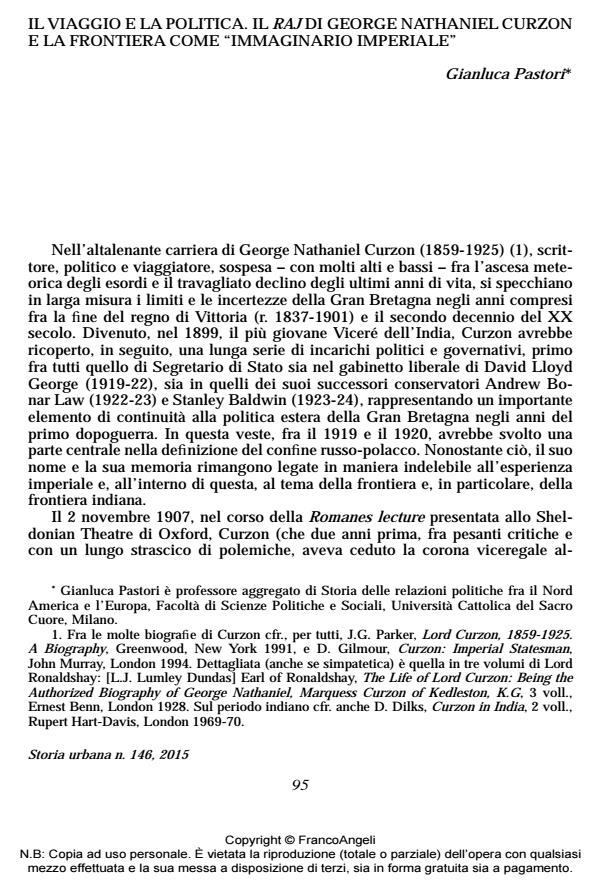The travel and politics. The Raj of George Nathaniel Curzon and the frontier as "imperial imaginary"
Journal title STORIA URBANA
Author/s Gianluca Pastori
Publishing Year 2015 Issue 2015/146
Language Italian Pages 19 P. 95-113 File size 259 KB
DOI 10.3280/SU2015-146005
DOI is like a bar code for intellectual property: to have more infomation
click here
Below, you can see the article first page
If you want to buy this article in PDF format, you can do it, following the instructions to buy download credits

FrancoAngeli is member of Publishers International Linking Association, Inc (PILA), a not-for-profit association which run the CrossRef service enabling links to and from online scholarly content.
George Nathaniel Curzon (1859-1925), Viceroy of India, Foreign Secretary and -in the fi rst part of his life - prolifi c traveler and writer, played a key role in shaping the Frontier as a political problem and as a locus of the "imperial imaginary". From the fi rst travel in Russia and Central Asia, in 1888-89, to the Romanes Lecture in 1907, his prestige and infl uence were pivotal in merging the poplar dimension of the issue with the needs and the constraints of the "high politics". His swift emergence in the power circles and length of his stay also contributed in providing authority to his vision and in making his infl uence greater. Part of a rich and commercially successful vein, started in the years immediately following the First Afghan War, Curzon’s works widely conditioned the fi nal stages of the British policy in India, before the outbreak of World War One, when the pendulum of the imperial interests swung back again to Europe. Curzon’s works especially conveyed the idea of the Frontier’s inherent lawlessness and ungovernability. In Curzon’s view, the Frontier was a world apart, ruled by its own rules, and inhabited by a very peculiar "race", radically "other" but deserving the utmost admiration for its fi erce defense of that same "otherness". Despite the evolution of the international scenario, these ideas proved long lasting. Enshrined into the separation of the Frontier from the territories of Punjab, they later entered the imperial imaginary as a sort of "shared consciousness" that, to a certain extent, still continue to shape the narrative of the Afghan-Pakistan border and of the people who live there. Is this "shared consciousness" more than the material elements to bear witness of the weight of the imperial heritage. A heritage that is very diffi cult to discard, at the level both of the political choices and of the representations that these choices inform and underlay.
Keywords: George Nathaniel Curzon Central Asia Frontier Great Game
Gianluca Pastori, Il viaggio e la politica. Il Raj di George Nathaniel curzon e la frontiera come "immaginario imperiale" in "STORIA URBANA " 146/2015, pp 95-113, DOI: 10.3280/SU2015-146005